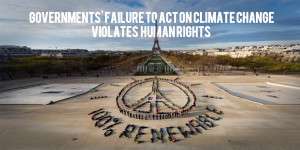By Alyssa Johl, Senior Attorney, Climate & Energy Program
Now that I have had some time to reflect on (and recover from) our time in Paris, I want to share some thoughts on what we achieved through our unprecedented campaign to include human rights protections in the 2015 Paris Agreement, and how we got there.
This effort was long in the making. Since 2009, the Human Rights & Climate Change Working Group has advocated to strengthen the linkages between human rights and climate change within the UNFCCC. In the lead-up to the 2009 climate talks in Copenhagen, the Working Group (at that time, a small group of lawyers and campaigners) called on countries to recognize the human rights dimensions of climate change. While countries failed to reach agreement in Copenhagen, the UNFCCC took a critical first step the following year, when it adopted the Cancun Agreements, which explicitly call on Parties to respect human rights when taking actions to address climate change.
In the five years since the Cancun climate talks, members of the Working Group have worked to protect the rights of those who are suffering adverse impacts of climate policies and projects. For example, we have assisted indigenous peoples groups, community-based organizations and other partners when they have not been consulted, when their families have been displaced, when their riverbanks have been flooded, when they have not been compensated for loss of lives and livelihoods, all in the name of climate action. What we know as rights advocates is that you can’t address one problem (climate change) at the expense of peoples and communities.
While providing direct support to communities experiencing climate-related harms, we continued to advocate for human rights protections within the UNFCCC. In February 2015, we secured the first reference to human rights in the draft negotiating text for the Paris Agreement, when Mexico, Chile, Tuvalu, Uganda, and others championed our language.
At the time, we celebrated but also recognized the uphill battle ahead. We also recognized that we needed the power of collective mobilization—unified yet diverse voices—to show countries that we were serious in our call for human rights to be integrated in climate action. Over the course of the year, we worked with our allies to build an unprecedented coalition (really, a movement) representing women and gender, indigenous peoples, labor and trade unions, youth, faith-based, human rights, environmental, and climate justice groups. We became a rights coalition.
Through consensus, we developed proposals in the lead-up to and during the Paris climate talks, calling on Parties to deliver a deal that protects both human rights and the integrity of the planet. And in the final days of the negotiations, in the face of a divide-and-conquer strategy that threatened to break us apart, we stood together and grew stronger. Many of these constituencies/organizations mobilized their members and supporters to pressure countries that were adamantly opposed to including any reference to human rights.
This unprecedented coalition, working hand-in-hand with country delegates and UN officials, proved to be immensely successful. Despite all odds (and much opposition from Saudia Arabia and others), we secured strong language calling on countries to respect and promote human rights in all actions taken to address climate change. This was a landmark achievement: it marked the first reference to human rights in any multilateral environmental agreement. The Paris Agreement is far from perfect but in this respect, it represents a watershed moment.

Most importantly, we put the issue of human rights on the political agenda of the UNFCCC, making it clear that the Paris Agreement’s human rights protections mark the beginning, not the end, of the road. Going forward, we have much work to do to build the capacity of countries to understand why and how to protect human rights when taking climate actions and to hold them accountable when they fail to do so.
I want to thank you all for your partnership in our collective effort to protect human rights and promote climate justice. Now is the time to translate words into action.
Originally posted May 2, 2016
